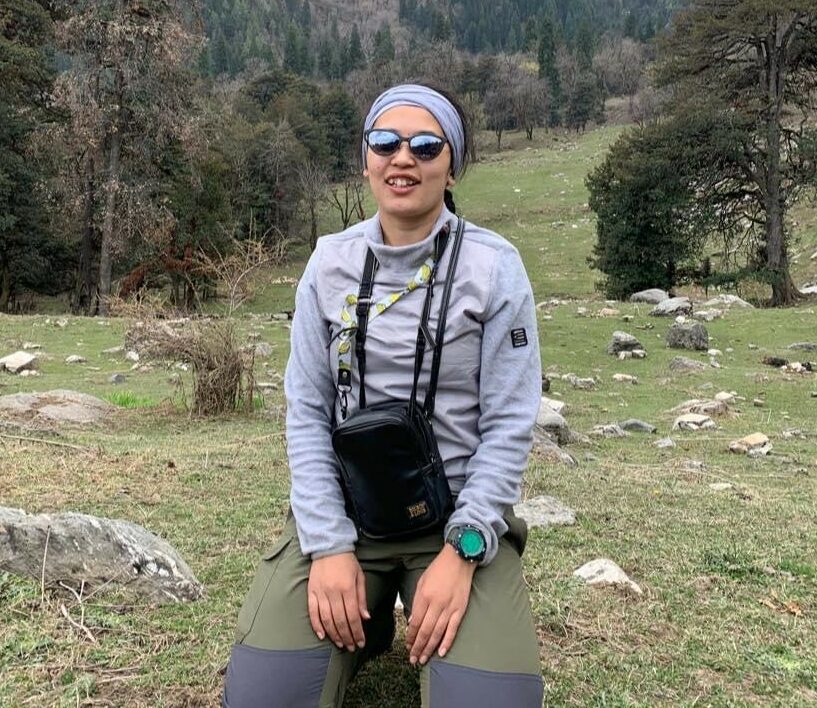My home town, Darjeeling, was going through a political turmoil and everything was shutting down, businesses, educational institutions, etc. I was in the final year of my Masters in Zoology course and I knew that I had to undertake an original research project in the form of a dissertation. The internet shut down too. At that point, my hope and enthusiasm was fading fast and everything was so uncertain and blurred, I wasn’t even sure if I would even graduate. But one day I decided to take my camera with me and take pictures of the birds around my village/small town. I started to take more and more and I ended up going to the forest twice in a day for 90 days out of the 107 days of shut down. My mum was a major driving force who constantly encouraged me to continue doing it and she would always accompany me. I remember very clearly (even though it was 7 years ago) the thrill I used to feel down my spine every time I photographed a new bird. Or for that matter, even if I saw a new bird, I would feel restless and anxious until I photographed it. At times I couldn’t sleep and very often dreamt of the birds that I would have wanted to see, like the Golden Pheasant and the Asian Paradise Flycatcher. The adrenalin rush would make my heart beat faster every time I started focusing my lens on a bird until I pressed that shutter. I would feel so bad if I missed a shot and worse if that was a bird that I hadn’t photographed earlier. The drive and motivation was so insane, I would go even when it would be pouring in the middle of the infamous Darjeeling monsoon. For me, the birds turned the shut down into a blessing in disguise because my MSc course did not allocate separate time for internship or dissertation, and I might have never gotten the chance to spend time in the field if not for the shut down.
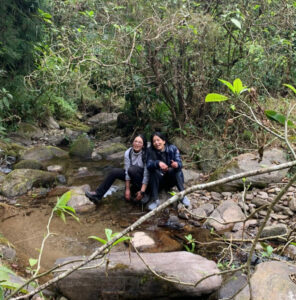 My Ama accompanying me during my fieldwork
My Ama accompanying me during my fieldwork
During the same time when I was visiting the forests around my village regularly, on one of those extremely gloomy and foggy days, I didn’t want to step out because there was very poor visibility. But I still did because mum insisted. It was so white and moist outside that I got water droplets on my eyelashes and hair. I could barely see two meters ahead and cars would just pop up like they were teleporting out of a portal along the road which was lined with trees and dense vegetation on both sides. Just as my bored and unhopeful self was giving up the hope of seeing any birds let alone photograph, suddenly out of nowhere, I sensed motion and instantly observed silhouettes of a flock of tiny birds, fluttering and hopping across the road. I took some quick steps and followed them as they were heading for the bushes below the road. I then looked below the road and could only see some leaves moving as the individuals in the front had already started to vanish in the fog. This had already triggered my adrenaline and I was making desperate attempts to find out what bird it was. Blessed was I, the last and the bravest individual decided to stop and pop its head from behind the ledge of the road to check me out. I pressed my shutter as I had already locked it on my viewfinder and when the focus slowly became sharper. It just gave me a fraction of a second to take its picture before following the flock which disappeared into the fog. Later on I had to take the help of professional birding guides from a nearby touristy town to identify the bird as the Rufous-throated Wren Babbler because I didn’t have a field guide or access to the internet at that point. That is the most memorable encounter I have had with it, soon after I realized how difficult it is to see it without using audio playback.
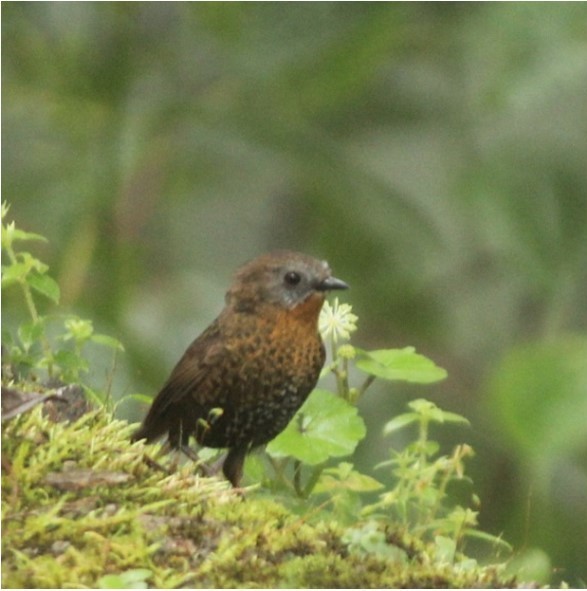 The picture I took of the Rufous-throated Wren Babbler on a gloomy day
The picture I took of the Rufous-throated Wren Babbler on a gloomy day
This is how my interest in nature and birds took shape..
In my case, my interest in wildlife and research connected me with birds as they were the most conspicuous fauna around me. I ended up doing my masters dissertation on the niche selection of birds around my village, Sukhia Pokhri. Thereafter, I joined the Padmaja Naidu Himalayan Zoological Park in Darjeeling as an intern. Here, I recorded bird species richness in the zoo premises and in other recreational green spaces in Darjeeling. There I met a fellow intern named Aamer, who actually showed me the way to step into research. He brought in news of intake of JRFs at the Zoological Survey of India for a project, which I interviewed for and got into. And just like that, I started my career in conservation.
I learnt most of the data collection techniques and data analysis in the first year of my engagement as a project JRF at the Zoological Survey of India (ZSI), thanks to my incredibly giving and helpful Research Associates who have been my guiding stars. After a year, I registered as a PhD candidate at the University of Calcutta, which is a sister institute to ZSI. For my PhD, I studied the habitat ecology of the Kalij Pheasant and Hill Partridge. You can read about my PhD work here.
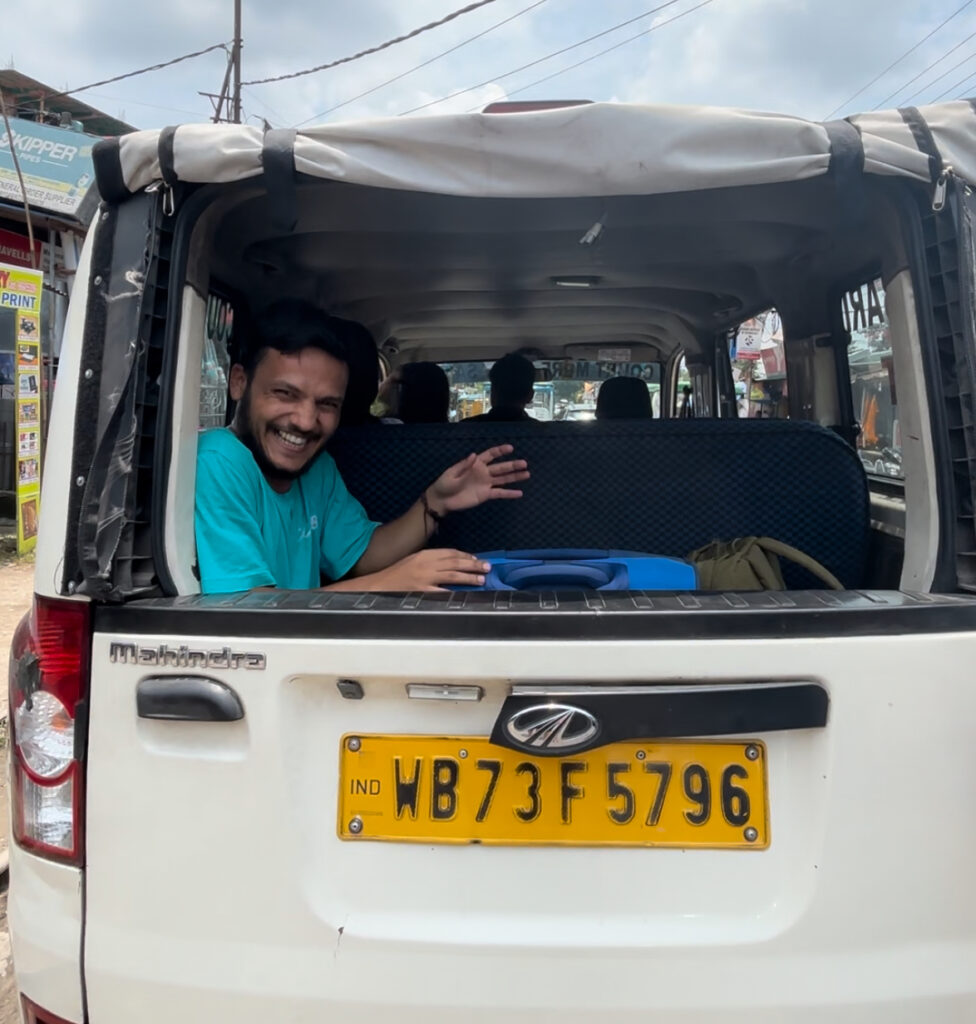 Aamer recently visited me before leaving for Australia to pursue his PhD
Aamer recently visited me before leaving for Australia to pursue his PhD
I am currently studying the nuances of human-wildlife interaction, of species perceived to have an impact on human lives (including birds). I work with the communities in Darjeeling and Kalimpong to find ways to facilitate sustainable coexistence and to conserve the overall biodiversity of corridors that connect PAs in the region. I am working with the regional director, Dr. Sarala Khaling of the Ashoka Trust for Research in Ecology and Environment (ATREE), North-East Regional Center, Gangtok and Dr. Reinmar Seidlar, Research Assistant Professor, University of Massachusetts, Boston, USA as a Research Associate.
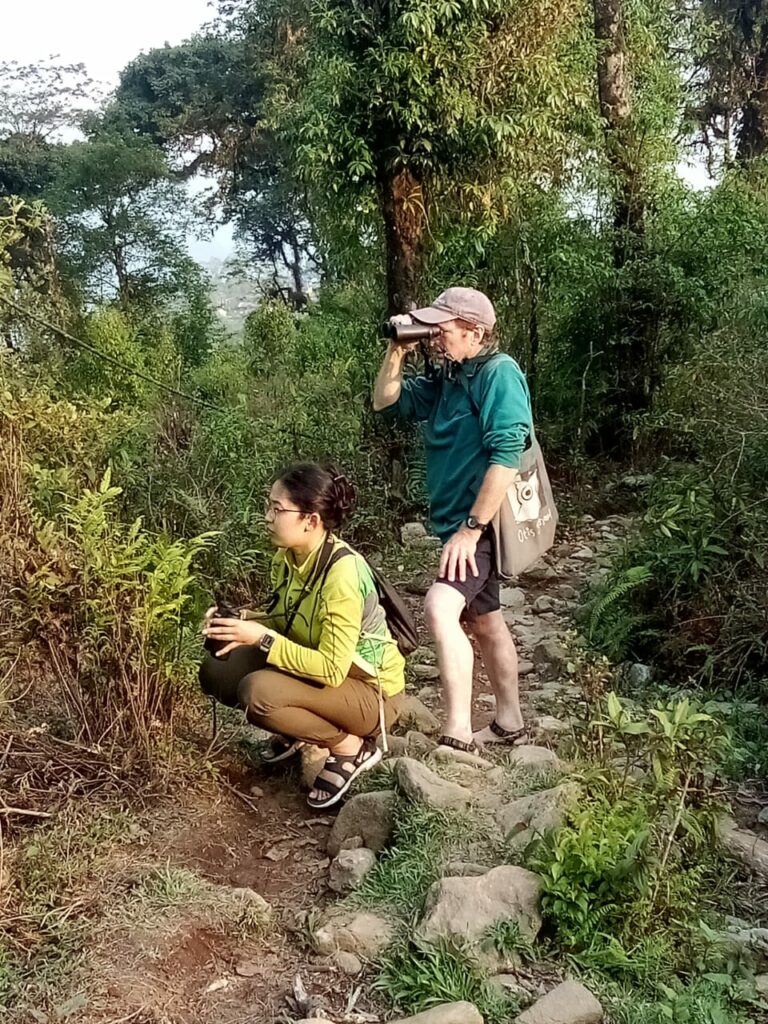 Dr. Seidlar and me watching birds on the borders of Neora Valley National Park
Dr. Seidlar and me watching birds on the borders of Neora Valley National Park
I love what I do because…
The thing that I appreciate the most about my work is that I get opportunities to make a difference. It is much more frustrating to live otherwise in the current state of the world which needs so much work, effort and empathy. Other than that, I am an outdoorsy person and my work just won’t let me stay indoors for long, which is perfect. I get to be in nature more often. There are very few jobs out there which allow us to be outdoors. Most importantly, it lets me meet, live and work with humble people which helps me stay humble as a person, keeps me grounded, motivated, content and at peace.
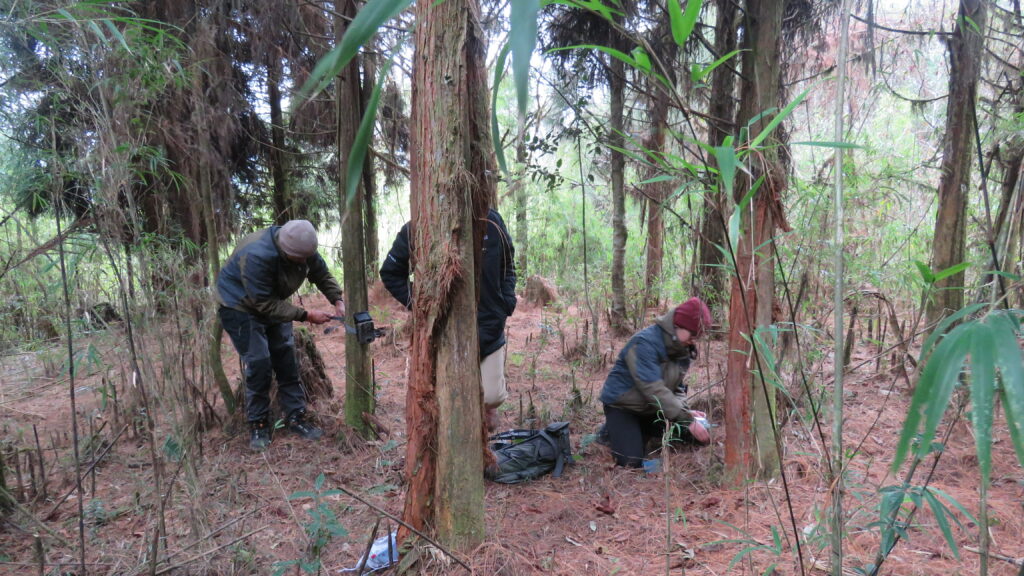 Setting up camera traps for pheasants in Darjeeling with my excellent team mate Pujan Pradhan and staff of the forest department
Setting up camera traps for pheasants in Darjeeling with my excellent team mate Pujan Pradhan and staff of the forest department
Challenges I faced..
The greatest challenge that I face in my work is to stay positive and optimistic because I get to see the impact of global phenomena such as climate change first hand. The impacts are often manifested in the form of human-wildlife conflict which is threatening the peaceful coexistence that prevailed in the past. I am often confronted with questions such as, “What will you do to make things better for us?”, “What is the solution?”, “What does our future look like to you?” These are very difficult questions to answer, especially when I am talking to people who need not necessarily be well acquainted with geopolitics, world economy, fast fashion, over consumption and globalization, which is instigating this hyper want for everything leading to global warming. As a person belonging to the same community I work with, it is extremely challenging for me to put up a professional front all the time and not become emotional and frustrated with what is happening to the overall biodiversity in Darjeeling and Kalimpong.
My advice for young researchers is..
I’ll share what has helped me as advice here for researchers in general. Being helpful, open to criticism and suggestions, and any kind of work gradually becomes your strength. Learning to ask for help has gotten me through 90% of all day to day troubleshooting. Building a support system (individuals who honestly want you to do good) for myself was my greatest investment, it has helped me get through my worst. What one should avoid at all cost is being stuck with one group of professionals, one should always have multiple people in the relevant profession who will vouch for you anytime. As far as ornithological research is concerned, I suggest that future scientists should focus on observing species’ relationship with the components of their habitat rather than making correlational conclusions (which I did).
Ms. Avantika Thapa
Email: [email protected]
Research Associate, Ashoka Trust for Research in Ecology and the Environment
Instagram handle
Facebook profile
Linkedin account
Twitter handle

